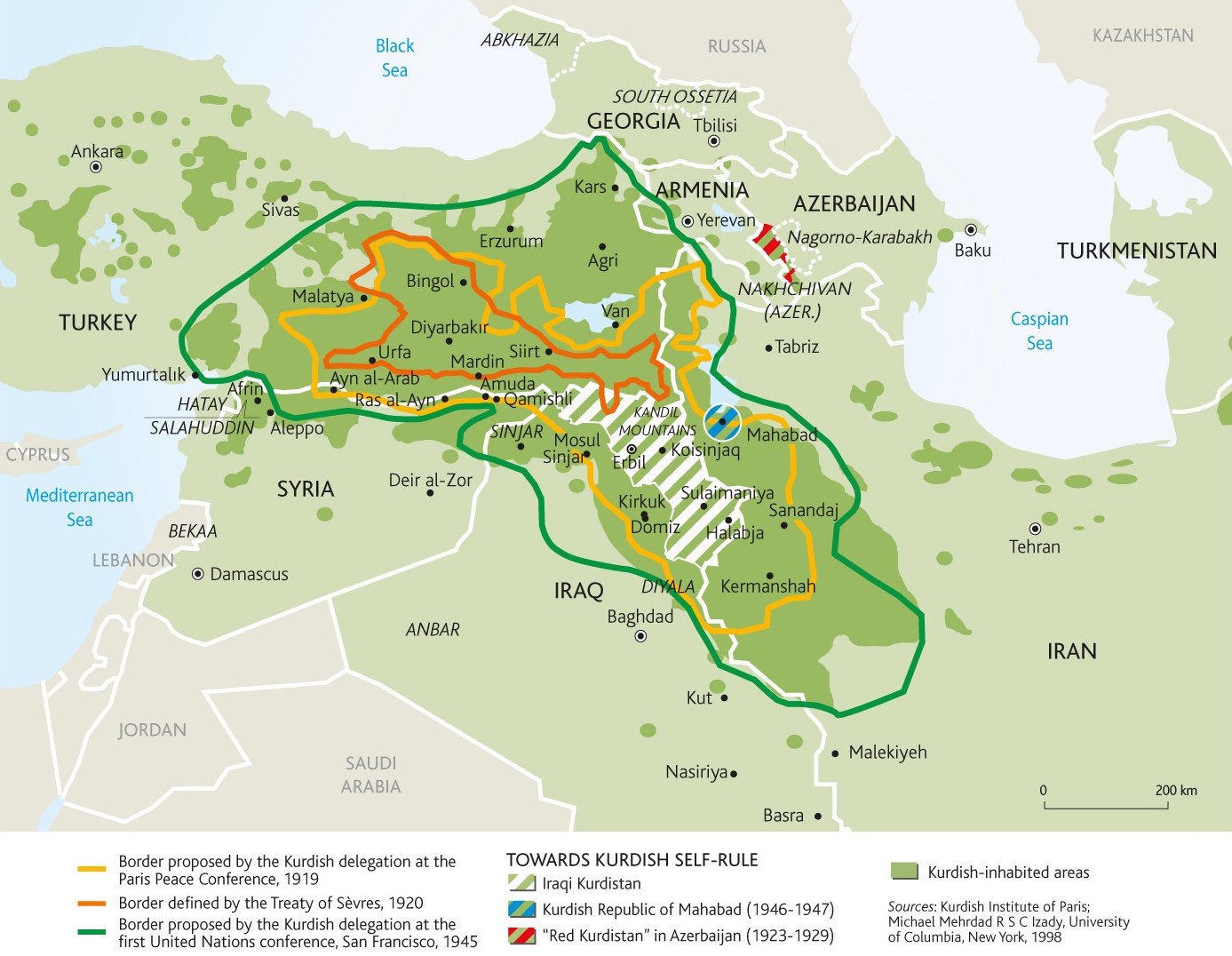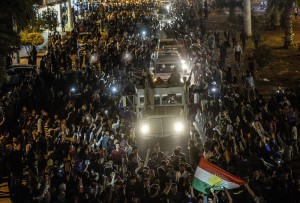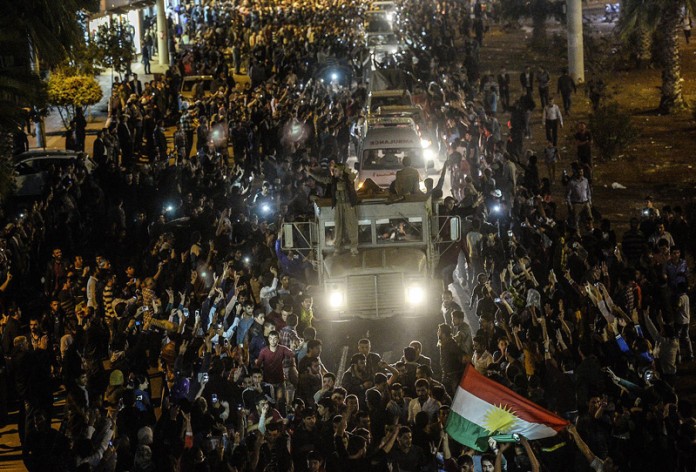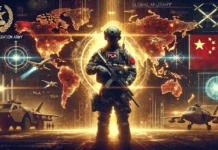Part 1 of 3 in a special series about the role of Kurds in the war with ISIS

The fighting between ISIS and the Kurds stretches along a six-hundred-and-fifty-mile front in northeastern Iraq and Syria — a jagged line that roughly traces the border of Iraqi Kurdistan, the territory that the Kurds have been fighting for decades to establish as their independent state. With as many as 30 million people spread across the Middle East, the Kurds claim to be the world’s largest ethnic group without a country. Iraqi Kurdistan, which contains about a quarter of that population, is a landlocked region surrounded almost entirely by neighbours — Turkey, Iran, and the government in Baghdad — all opposing its bid for statehood.
“one of ISIS’ main achievements so far, has been uniting the many, sometimes historically rival Kurdish factions on the battlefield”
The recent incursion of the Islamic State in Iraq and el-Sham (ISIS – aka Da’ish) now presents the Kurds with both an opportunity but also great risk. In June, the Islamic State’s army swept out of the Syrian desert and into Mosul, Iraq’s second-largest city. As the Islamist forces took control, Iraqi Army soldiers fled, setting off a military collapse throughout the region.
The Kurds, taking advantage of the chaos, seized huge tracts of territory that had long been claimed by Kurdistan, but held by the Iraqi government in Baghdad. With the newly acquired land, the political climate for Kurdish independence seemed promising. Moreover, one of ISIS’ main achievements so far, has been uniting the many, sometimes historically rival Kurdish factions on the battlefield, creating political partnerships where there had been enmity.
This trend has also created considerable headache for Turkey – the foremost opponent of the Kurdish independence. Ankara is concerned that this new found “combat unity” could eventually become a trigger for future Kurdish independence demands, backed by western led anti-ISIS coalition elements.
Kurdish forces have clashed with ISIS on Syria’s northern border city of Kobani for nearly 50 days in what has become one of the closest watched and longest lasting battles involving ISIS. Despite being outnumbered and outgunned, the Kurds’ united front against the Islamists has so far been quite effective, although, with much needed aerial support from a U.S.-led coalition becoming a crucial element in the fighting.

Although Turkey allowed a limited number of Kurdish peshmerga fighters to cross into the Kobani combat sector, it does not want its homeland Kurdish groups to help Syria’s Kurdish Popular Protection Units (YPG) fighting ISIS there and only maintain a constant stnad-off vigil by placing tanks on the highline overlooking the town but without interfering in the battle.
But the crucial conflict will enfold in Iraq itself, drawing anti-ISIS Sunni and Sh’ite elements into the fray. Sooner or later a bloody inter-religious show-down will occur, when Iran interferes, leaving Saudi Arabia in a serious dilemma how to react.
Iraq was created in 1920, as a post-war British mandate, by the League of Nations, predecessor of the current United Nations (UN), within the new Middle East. From the start, it was an unstable amalgam of three former provinces of the Ottoman Empire: a predominantly Shi’ite one in the south, a Sunni-dominated one in the center, and a largely Kurdish population in the north. Though many national groups in Europe and the Middle East gained statehood, the Kurds were split among the new states of Iraq, Syria, and Turkey and the ancient one of Iran.
Indeed Turkey’s stance towards the Kurds in Iraq is now very different. As the government of Sunni Turkey fell out with its Shia-led counterpart in Baghdad, the Kurds of northern Iraq became, still a highly suspicious neighbor, but now turning into a crucial ally, as the conflict between Shia and Sunni, especially ISIS, is turning the region into a religious war.
Until recently, they were bitter enemies. Ankara had never been able to stomach the idea of Kurdish self-government – in Iraq or Syria or Turkey proper – and it had generally refused to give in to Turkish Kurds’ demands for cultural rights. Instead, it preferred to crack down on them.
The Syrian civil war and developments in Iraq have started to change all that. In mid-2013, ISIS turned its sights on three Kurdish enclaves that bordered its territory in northern Syria. It launched repeated attacks that until mid-2014 were repelled by the Popular Protection Units (YPG) – the armed wing of the Syrian Kurdish Democratic Unity Party (PYD). The turning point was an offensive in Iraq in June that saw ISIS overrun the northern city of Mosul, routing Iraqi army divisions and seizing weaponry later moved to Syria.
The Kurds as a nationality have now re-appeared on the world stage. As ISIS did along the Iraqi-Syrian border, they’re undoing Sykes-Picot for themselves. On this changing political landscape it feels as though everyone is learning the rules of a new game.
In a careful long-shot view, if anything good should come out of the present Islamic turmoil in Iraq and Syria, it could perhaps improve the traditionally suspicious ties between Turkey and the region’s Kurds.
This article is first in a three-part series. Stay tuned for:
- Part II – ISIS and the Kurds – Changing winds in Mid-Eastern power play (scheduled: December 7, 2014)
- Part III – Turkey and the Kurds – Practical coexistence with Turkey (scheduled: December 8, 2014)










